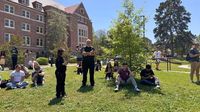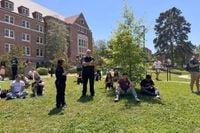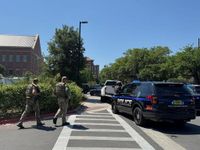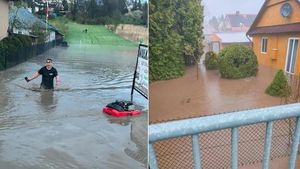On Thursday, April 17, 2025, a tragic shooting at Florida State University (FSU) left two people dead and at least six others wounded. The incident unfolded around 11:50 a.m. ET, near the university’s student union, where a gunman opened fire, prompting an immediate response from law enforcement.
The shooter, identified as 20-year-old Phoenix Ikner, the son of a sheriff’s deputy, was apprehended after officers confronted him and shot him when he refused to comply with commands. Following the incident, the university issued an active shooter alert, and by mid-afternoon, law enforcement announced that the threat had been neutralized.
Students described a chaotic scene as they fled from the sound of gunfire. Many sought refuge in a bowling alley and crammed into a freight elevator inside the student union. Ryan Cedergren, a 21-year-old communications student, recalled the moment he and about 30 others hid, stating, "In that moment, it was survival." Others, like junior Joshua Sirmans, were alerted by alarms warning of an active shooter while they were in the library.
Authorities confirmed that the two victims who lost their lives were not FSU students. Six others were taken to Tallahassee Memorial Hospital, where one was reported to be in critical condition, and the others were in serious condition. The extent of the injuries among the victims and the shooter was not immediately clear.
Leon County Sheriff Walter McNeil revealed that Ikner used his mother’s former service weapon during the attack. He emphasized that the suspect had been a longstanding member of the sheriff’s office’s youth advisory council and had participated in various training programs. McNeil stated, "We will make sure that we do everything we can to prosecute and make sure that we send a message to folks that this will never be tolerated here in Leon County, and I dare say across the state and across this nation."
In the wake of the shooting, Florida State University canceled all classes and university events through Friday, April 18, with all athletic events suspended until Sunday, April 20. This decision came as a precautionary measure to ensure the safety and well-being of students and faculty.
President Donald Trump, who was briefed on the situation, expressed his condolences, stating, "It’s a horrible thing. It’s horrible that things like this take place." He also highlighted the issue of gun ownership, saying, "These things are terrible, but the gun doesn’t do the shooting. The people do."
FSU President Richard McCullough described the day as tragic for the university community. He commended campus police for their swift response, which he believed prevented a larger tragedy. McCullough visited some of the wounded students in the hospital and expressed his support for those affected by the violence.
As the investigation continues, the FBI has joined local law enforcement to gather evidence and determine the motive behind the shooting. Sheriff McNeil indicated that Ikner had invoked his right to silence upon arrest, leaving authorities with many unanswered questions.
This shooting is not the first act of gun violence to occur at Florida State University. In 2014, a shooting at Strozier Library resulted in three injuries, with the gunman being killed by police within minutes of the first call. The previous incident, like this one, has left a lasting impact on the university community.
The campus of Florida State University, located in Tallahassee, is home to approximately 44,300 students. Founded in 1851, it is one of Florida’s twelve public universities and is situated just minutes from the state Capitol. The university has a history of resilience, but incidents like these raise serious concerns about campus safety.
In the aftermath of the shooting, students expressed their shock and fear. Many were glued to their phones, seeking updates and information while others gathered in groups, comforting one another. The sense of community was palpable, as FSU students and staff came together to support each other during this difficult time.
As the investigation unfolds, the focus remains on healing and recovery for the victims and their families. The university community is left grappling with the aftermath of this senseless act of violence, and many are calling for a national conversation on gun control and campus safety.
In an era where school shootings have tragically become more common, the FSU community hopes to find strength in unity and resilience. As they navigate this painful chapter, they are reminded of the importance of support and solidarity in the face of adversity.






